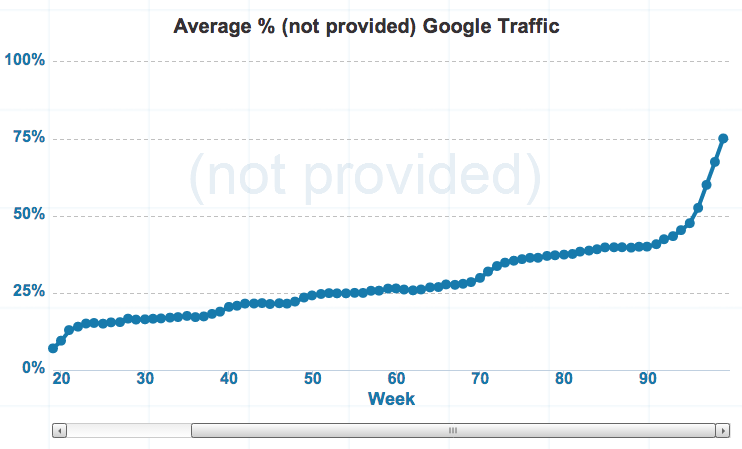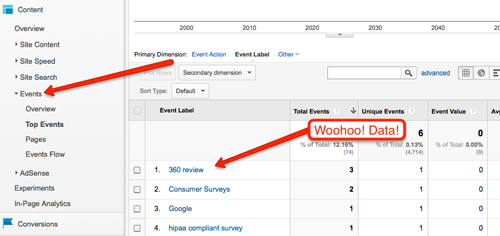In October 2011 Google started encrypting its searches with the aim of providing more privacy to searchers. This was the start of the (not provided) we began to see in our Google Analytics accounts. Over the months we've read numerous reports about there being less and less keyword data available to us in Google Analytics and now we've arrived at the point where it looks like Google will turn off all keyword data! If you're not familiar with any of this, what it means is that you will no longer be able to see which keywords people searched for in Google and arrived at your website.

Initially the encryption and protection was for people who were logged into a Google service, but now it's for people who aren't logged in too. Whilst this has been going on, a website was launched which monitors the (not provided) count across 60 websites and the current status reveals the following:

Here are some interesting statistics that the website provides:
- 75.16% of all searches are currently marked as (not provided).
- (not provided) was enabled 707 days ago.
- It's estimated that 100% (not provided) will happen on December 5th, 2013.
There's a lot of debate around why Google is doing this, some feel that it is to prevent the NSA from being able to spy (post-prism) and others believe that it's to fuel their advertising network (Google AdWords). Google AdWords still shows keyword data. At this point there's no real way to determine what the reason is so we're watching closely to see what happens next.
How does this effect you?
As a website owner who enjoys looking in Google Analytics at what keywords people are searching for and arriving at your website, will no longer be able to do this.
Of course, there are ways to use
Landing Pages to get around the (not provided). It's not a perfect solution, but it'll at least give you an idea of what sort of keyword a person is searching for and arriving at your website - the better the structure of your website, the better the results will be. Consider our
website review service perhaps. You could also have a read of
Which keywords are bringing you business.
Another way to get an idea, although not the most accurate, is to use Google Webmaster Tools. By logging in, clicking on Search Traffic and then Search Queries you're presented with keywords, impressions, clicks, CTR (click through ratio/rate) and the average position that the keyword appears in the search results. Again, this information is said to be rather inaccurate (The data is limited to the top 1000 daily search queries and top 1000 daily landing pages for the past 30 days) so be careful making assumptions. Remember, this data is also visible in Google Analytics: Traffic Sources > Search Engine Optimization > Search Queries.
What about South Africa?
When it comes to algorithm updates and the likes, South Africa is often only affected several months later, but this certainly isn't the case for the (not provided) count. Of the 100+ Google Analytics accounts that iMod Digital has access to, there is an average of about 80% (not provided) across the accounts so this is most certainly happening in South Africa and as quickly as it is happening overseas.
Here are three real examples of large websites across three market verticals in South Africa that we manage showing the (not provided) count over the past 2 years:

Vehicle Industry

Travel Industry

Retail Industry
Get the data from your users?
If keyword data is incredibly important to you, why not ask your visitors what they searched for? This could be done on your enquiry form, the "how did you hear about us approach" or what about a small popup window that appears on your website when someone from Google arrives? Upon thinking about this I turned to Google and found that someone had already done this. By placing this code on your website, right at the end of the code, you'll prompt visitors that come from Google with a question about which keyword they searched for:
<script type="text/javascript">
var __sg_np_tool_percentage_np_visitors = 100; //ask 100% of visitors that lack Google keywords
(function() {
var ganp = document.createElement('script');
ganp.type = 'text/javascript'; ganp.async = true;
ganp.src = '//d34wpjv4rf3nwa.cloudfront.net/www1/ganp.js';
var s = document.getElementsByTagName('script')[0]; s.parentNode.insertBefore(ganp, s);
})();
</script>
Side note: If you want to remove the credit from the script, add this to your stylesheet: .sg_np_infolink { display: none; }
The data captured from the users will be saved as an event in Google Analytics, like so:

This isn't an amazing solution, but it certainly is a way to capture some really useful data!
Is this the end of the world?
Absolutely not! Although knowing which keywords are bringing people to your website is useful, it is most certainly only a tiny part of the conundrum! Traffic sources, landing pages, AdWords data, Google Webmaster Tools and the likes are all still there, there is plenty of data that may be used to understand who your audience is and how to best serve them.
Ending with a smile!
If you're an SEO and you're reading this article, you might find this website a good laugh 😉






